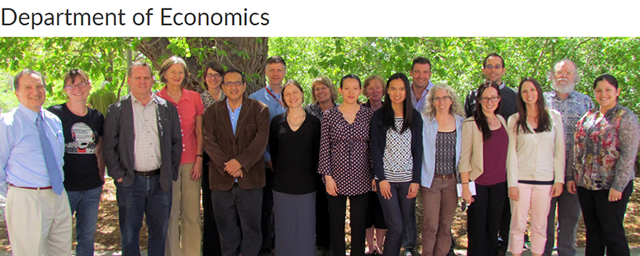
Economics ETDs
Publication Date
9-22-1975
Abstract
The objective of this study is to examine the efficacy of two closely related pricing policy suggestions. These pricing prescriptions, put forth by Herbert Mohring and David Winch, are suggested as a means of achieving an economically efficient allocation of highway facilities and as criteria for efficient highway investment decisions. In the final analysis these suggestions are reviewed within a Pareto optimum framework. The question, then, is: Will an alteration in these prescriptions be such as to make at least some members of the community better off without making any others worse off? This study concludes that the answer is affirmative. In other words, neither prescription provides necessary or sufficient grounds for a Pareto optimum solution. This conclusion is based on two separate considerations. The first consideration is whether or not these prescriptions will lead to an economically efficient solution. The belief on the part of Mohring and Winch that their respective prescriptions will achieve such a solution is questioned on positive analytical grounds. The basis for this questioning is the abstraction from the jointness of supply characteristic of highway facilities. The requirements for an efficient solution are severely altered upon recognition of this characteristic of highway facilities. The second consideration, which has led to the conclusion that neither prescription will lead to a Pareto optimum solution, is the framework of the respective discussions. Both Mohring and Winch put forth arguments in favor of ignoring income distributional considerations in their prescriptions. This study concludes that neither of the arguments is valid within the Pareto optimum framework. Further, it is concluded that the narrow efficiency framework of analysis used by Mohring and Winch is neither necessary nor sufficient for a Pareto optimum solution. The Pareto criterion requires that equity considerations as well as efficiency considerations enter the analysis. Equity considerations are seen to be most important in highway investment decisions. This study also seeks to summarize the discussion of beneficiaries of highway investments. Mohring and Winch concluded that on the whole the majority of benefits can be determined by estimating the benefits to highway users. The basis for this conclusion is reviewed in the discussion of highway beneficiaries.
Degree Name
Economics
Level of Degree
Masters
Department Name
Department of Economics
First Committee Member (Chair)
Gerald Joseph Boyle
Second Committee Member
Allen V. Kneese
Third Committee Member
Albert Marion Church III
Language
English
Document Type
Thesis
Recommended Citation
Hein, Scott Edward. "Two Pricing Suggestions for Highway Expenditure Analysis: A Critical Review." (1975). https://digitalrepository.unm.edu/econ_etds/141
